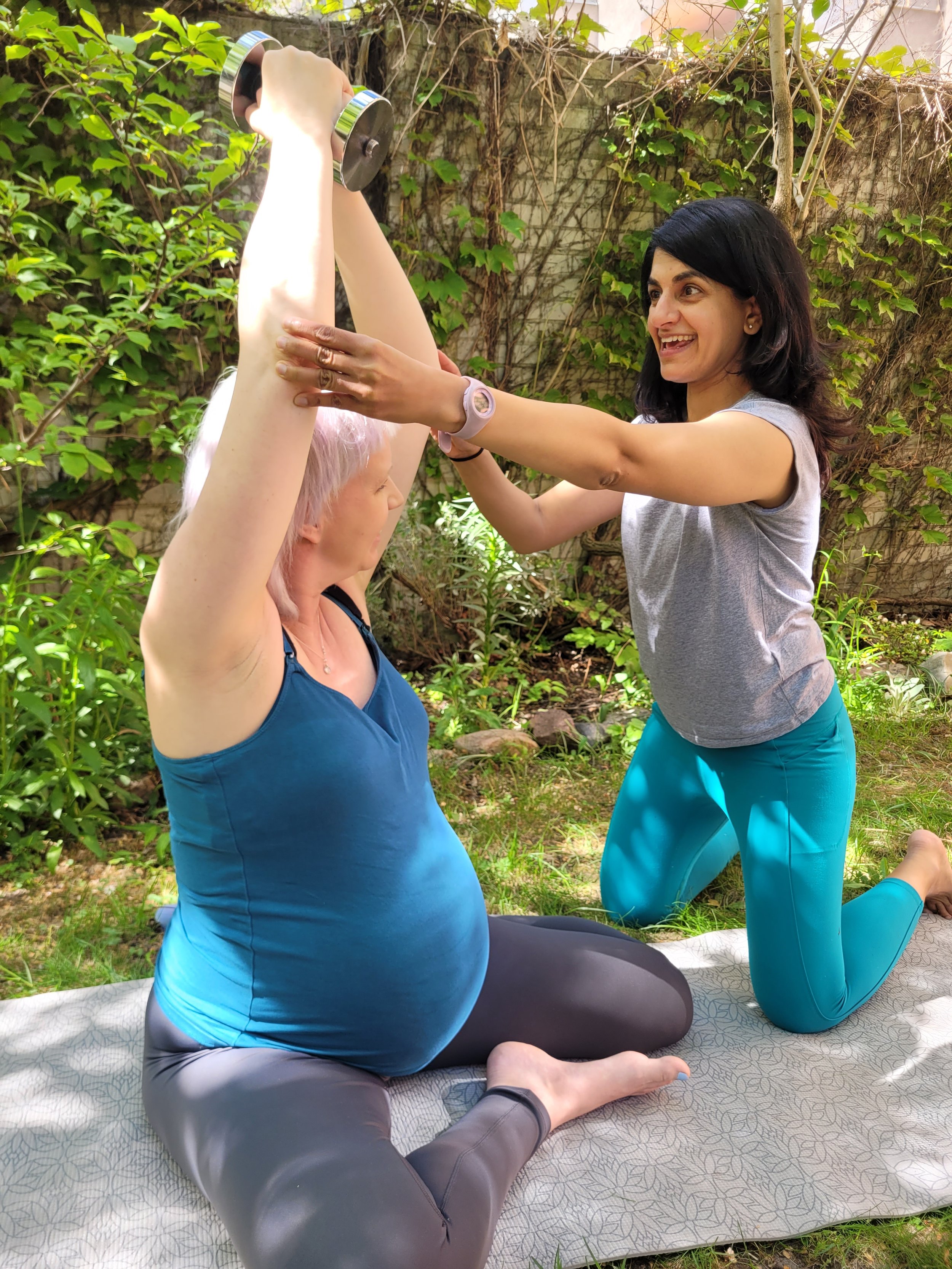Can I strength train during pregnancy?
So you’re wondering if strength training during your pregnancy is a good idea? Let's dive into the most questions that come up during this stage.
The most common question I get asked is: Can I safely strength train when pregnant?
Simple answer - absolutely! For most women, strength training is not only safe but can be incredibly beneficial. Think of it as building a strong foundation for all the amazing things your body will be doing. Of course, it's always good to discuss this with your doctor or midwife before starting or continuing any new exercise program during pregnancy. They can provide personalized advice based on your individual pregnancy journey.
In this article, I’ll explain the key things to be aware of and how to keep yourself safe during your preggo journey.
How do I take precautions to stay safe?
Safety is key! Here are some important precautions to keep in mind:
Listen to your body: This is your number one guide! Pay attention to any pain, discomfort, dizziness, shortness of breath, or unusual sensations and stop if you feel them.
Modify exercises: As your belly grows, you'll need to adapt your exercises. Opt for inclined positions or side-lying variations. You might also need to widen your stance for better balance.
Reduce the intensity and weight: Focus on maintaining strength and endurance rather than increasing it significantly. Use lighter weights and higher repetitions if needed. Pregnancy brings hormonal changes that can affect your joints, so I advise to push yourself no more than 7/10 on the effort scale after the first trimester.
Focus on proper form: Good technique is always important, but even more so during pregnancy. It helps prevent injuries and ensures you're targeting the right muscles. Consider working with a qualified trainer who has experience with prenatal fitness.
Stay hydrated: Drink plenty of water before, during, and after your workouts.
Avoid overheating: Dress in layers so you can adjust if you get too warm. Avoid exercising in very hot or humid environments.
Don't hold your breath: Breathe naturally throughout each exercise. Exhale during the exertion phase and inhale during the recovery phase.
Be mindful of balance: Your center of gravity will shift as your pregnancy progresses, so be extra cautious with exercises that challenge your balance, hold onto something (or someone!) for support if needed.
Jumping You don’t need to avoid jumping completely but chances are you won’t be comfortable doing this after the early stages of pregnancy, so I usually suggest avoiding this after the 1st trimester.
How do I know my baby is protected?
It's natural to worry, but rest assured that your baby is well-cushioned and protected within your uterus, the placenta is a magical ball of cushiony jelly around your baby. As long as you're following the safety precautions and listening to your body, the gentle movements of strength training are unlikely to harm your baby. In fact strength training does encourage more blood flow and an increased amount of oxygen in the body which is good for you. If you ever have any concerns about your baby's well-being, speak with your health practitioner.
What are the benefits?
Oh, there are so many wonderful benefits to strength training during pregnancy, here are just a few. It can help you:
Maintain a healthy weight: Supporting both your well-being and your baby's.
Reduce back pain: By strengthening your pelvic floor, core and back muscles, you can better support your growing belly.
Improve posture: Counteracting the changes in your body's center of gravity.
Boost energy levels: Regular exercise can actually combat fatigue.
Prepare your body for labour and delivery: Strong legs, core, and arms can be incredibly helpful during labour.
Speed up postpartum recovery: Being physically fit can make it easier to recover after giving birth.
Improve mood and reduce stress: Exercise releases endorphins, those natural mood boosters!
Reduce the risk of gestational diabetes and preeclampsia: Some studies suggest a link between exercise and a lower risk of these conditions.
Are there any studies about pregnancy and strength training, what do they say?
Yes, there's a growing body of research supporting the safety and benefits of strength training during pregnancy for healthy women. Studies have generally shown that moderate-intensity strength training doesn't increase the risk of preterm birth, low birth weight, or other adverse outcomes. In fact, some research suggests it can positively impact maternal fitness, reduce back pain, and improve overall well-being. While more large-scale, long-term studies are always valuable, the current evidence is encouraging and supports the idea that strength training can be a safe and beneficial part of a healthy pregnancy.
Are there any drawbacks to training when pregnant? What should I avoid?
For most women, the benefits of strength training during pregnancy far outweigh the potential drawbacks, especially when done safely and with modifications. However, there are some things to be mindful of and exercises to potentially avoid:
Exercises that put direct pressure on your abdomen: Like lying face down.
High-impact exercises: Such as jumping or plyometrics, especially as your pregnancy progresses, due to increased joint laxity and balance changes.
Exercises that involve Valsalva maneuver (holding your breath forcefully): This can increase intra-abdominal pressure. Focus on controlled breathing.
Heavy lifting: As mentioned before, now isn't the time to push your limits. Focus on maintaining strength with moderate weights and maximum of 7 out of 10 on the effort scale.
Exercises that cause pain or discomfort: Always listen to your body and stop if something doesn't feel right.
Activities with a high risk of falling: Be cautious with exercises that challenge your balance.
Remember, every pregnancy is unique, and what feels good for one woman might not feel right for another. One woman can also feel very different from one pregnancy to the next. The most important thing is to stay in tune with your body, communicate with your healthcare provider, and enjoy the journey of nurturing yourself before your baby is born.


